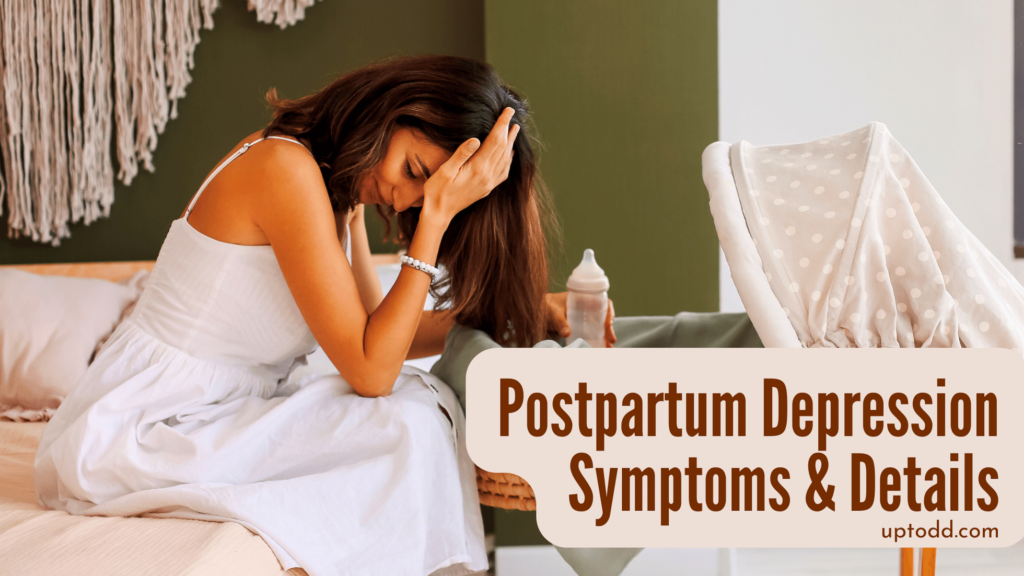
The joy of welcoming a new life into the world is marked by tender moments. However, for some mothers, the postpartum period can bring more than just the usual challenges. It can herald the beginning of a silent battle known as postpartum depression (PPD). Postpartum depression (PPD) affects up to 15% of moms. Recent research has discovered a number of psychosocial and biological risk factors for PPD. Postpartum blues have been found in 15-85% of women within the first 10 days after giving birt. With the fifth day having the highest prevalence, when Postpartum Depression Symptoms starts coming up
Post Partum Depression
Postpartum depression is a type of clinical depression that occurs after childbirth in parents, usually in mothers. It goes beyond the common “baby blues.” Baby Blues commonly include mood swings, fatigue, and anxiety in the first few weeks after birth. Postpartum Depression Symptoms are distinguished by persistent and severe feelings of sadness, hopelessness, and disinterest in the baby. It is crucial to recognize the symptoms and seek treatment and assistance from healthcare professionals.
In the ICD-10, postpartum depression falls under the category of “Mood [affective] disorders,” specifically termed as “F53.0 Postnatal (postpartum) depression.” It is classified as a type of depression that occurs within six weeks after childbirth.
Reference from Postpartum Depression
Postpartum Depression Symptoms
Postpartum Depression symptoms extends beyond the traditional “baby blues.” It includes persistent feelings of melancholy, worry, and other difficult emotions. These can have a substantial influence on the well-being of a new parent. Recognizing the symptoms and seeking help are critical stages in managing the postpartum journey.
List of prominent symptoms
-
- Persistent Sadness or Hopelessness: Feeling continuously depressed, empty, or hopeless for an extended period of time but dont confuse yourself if this emotion is for few days or short time because this kind of feeling also happen due to hormonal change. Post partum symptoms stay for longer duraation in absense of abundance of love and support.
-
- Loss of Interest: Loss of interest in enjoyable activities or a sense of alienation, even while the infant is around.
-
- Appetite and Sleep Changes: Significant changes in eating habits or sleep patterns, including excessive or inadequate sleep and appetite changes.
-
- Bonding Difficulties: Having difficulty forming an emotional connection with the infant or feeling emotionally distanced from them.
-
- Overwhelming worry, panic attacks, or constant distressing thoughts about the baby’s well-being are examples of intense anxiety.
-
- Physical Symptoms: Some people may have inexplicable physical discomfort, such as headaches, stomach problems, or general bodily discomfort.
-
- Difficulties with Concentration and Decision-Making: Difficulties focusing, making decisions, or retaining clear memory recall.
-
- Feeling of Worthlessness: Feelings of remorse about perceived parental failings or a sense of personal worthlessness.
How Can partners and family help mothers facing Postpartum Depression Symptoms?
-
- Sharing Responsibility: Raising a newborn is a beautiful journey. When the father and mother both are handling things together it becomes a smooth slope at that time. After delivery, a mother goes through various changes in her own self forms of body image issues, hormonal changes and sleepless nights. So it becomes vital that responsibilities are shared spo that mother can too recover from the changes within her.
-
- Monitoring wellbeing: In the excitement of a new baby’s arrival all the energy of the partner and other family members goes towards the baby, in which we tend to unintentionally neglect the mother. It is very important that we monitor the well being of the mother too by taking care of her Emotional, Psychological and physical needs.
-
- Offer Emotional Space: It is okay for a mother to feel overwhelmed emotions. As a partner, it is important to respect her emotions and help her with the uncertainty she might be having due to a change of roles. Allowing the mother to express her emotions and supporting her can help in creating an emotional space for her.
Support from Family & Professionals
-
- Involve family and friends: It is important to involve family and friends to help woman suffering from postpartum depression. Educating about PPD—its signs, symptoms, and prevalence—first and foremost fosters empathy and understanding. This lays the groundwork, such as helping with housework or caring for the infant, which lightens the mother’s load. Furthermore, encouraging open communication and a nonjudgmental environment ensures that the mother feels heard and supported. This contributes considerably to her emotional well-being.
-
- Lay emphasis on self-care: Post-delivery mothers tend to not take care of themselves, which increases the risk of postpartum Depression. We can encourage the mother to indulge in self-care activities, which could be as essential. Maybe as small as taking a walk in the park, visiting her favorite cafe, or maybe a shopping spree.
- Normalize seeking Professional Help: Seeking professional help in case of psychological issues is a big taboo. Promote an idea of routine mental health check-ups. Similar to regular physical check-ups, especially during significant life events such as pregnancy and childbirth. Stress the importance of mental health professionals being trained to give specialized support and guidance customized to individual needs. Their knowledge and experience can provide valuable insights and solutions for dealing with postpartum depression.
